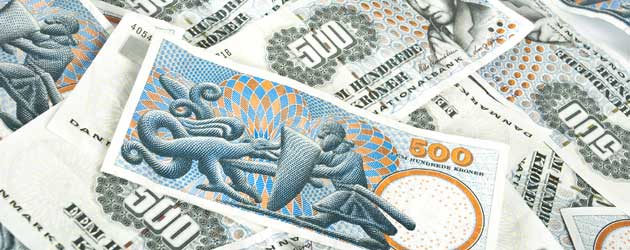The Pound (GBP) advanced against the Danish Krone (DKK) on Thursday as the Euro (EUR) pegged currency was weighed upon by more dire economic data out of Germany and as fears grow that the Eurozone is heading towards a recession.
Some economists have warned that it could take a small miracle to prevent Germany, the Eurozone’s largest economy from entering recession over the coming quarters as the impact of a faltering Eurozone economy and the standoff with Russia over Ukraine weighs.
Data released on Thursday showed that German exports tumbled by the biggest margin since January 2009. The negative report adds to the dire industrial production and factory orders data released earlier in the week.
According to the German Federal Statistics Office, exports out of the 18-member Eurozone’s largest economy fell by 5.8% in August, wiping out the 4.8% gain seen in the previous month, the figure was worse than the 4% drop expected by economists.
Because of the fall in exports, Germany’s trade surplus narrowed to €14.1 billion from the previous record high of €23.5 billion. The nation’s current account surplus also narrowed from €20.1 billion to €10.3 billion.
The negative data weighed on the Danish Krone as the currency is pegged to the Euro. A weakening in the Eurozone puts pressure upon the Danish Central Bank to take action in order to defend the Krones position.
The Danish central bank will keep a watchful eye on the European Central Bank in coming months as it seeks to protect the Danish currency’s peg to the Euro. It may be forced to intervene in currency markets or even take its deposit rate further into negative territory if upward pressure on the Danish Krone becomes too extreme.
Further losses for the Danish currency were restrained as data showed that the nation’s trade surplus increased in August.
According to Statistics Denmark, the Scandinavian nation’s trade surplus increased to DKK 7.2 billion in August, up from the DKK 6.3 billion recorded in the preceding month. Despite the increase, exports fell by 2.7% on a month on month basis but imports also declined by 5.1%.
A separate report also showed that the nation’s current account surplus increased from DKK 11.0 billion to DKK 14.7 billion in August.
Pound Sterling to Danish Krone Exchange Rate Forecast
The Pound was unlikely to receive much in the way of support from Thursday’s Bank of England interest rate decision as no statement was due to be released alongside the announcement. Economists were correct in forecasting that policy makers would choose to leave rates unchanged at 0.5%.
Friday promises to be a more interesting day in terms of the GBP/DKK exchange rate as the latest Danish Inflation and Industrial Production reports are due for release. The UK meanwhile is due to release its latest Balance of Trade data.
The Danish currency is likely to remain under pressure from the weakness in the Eurozone and if more data disappoints from the region we can expect the Krone to be pulled down along with the Euro.
Danish Krone (DKK) Exchange Rates
[table width=”100%” colwidth=”50|50|50|50|50″ colalign=”left|left|left|left|left”]
Currency, ,Currency,Rate ,
Pound Sterling, ,Danish Krone,9.4626 ,
,Danish Krone,9.4626 ,
Euro, , Danish Krone,7.4431 ,
, Danish Krone,7.4431 ,
US Dollar, , Danish Krone,5.8336 ,
, Danish Krone,5.8336 ,
[/table]


